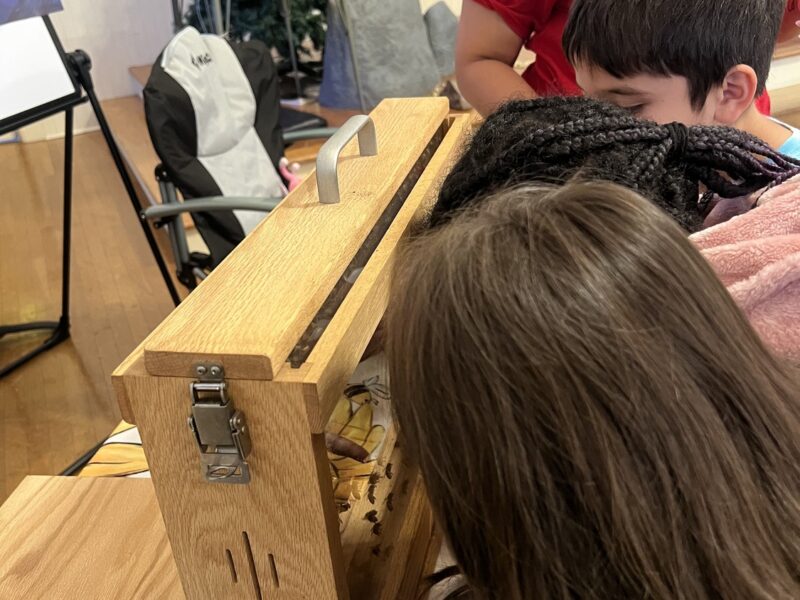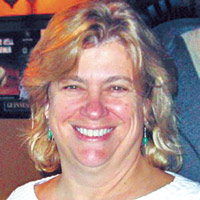

I may as well start off with an apology, because this column is more about me than it is about bees. Although bees were the driving force behind it all.
A few weeks ago, my friend Joanne Utley, pastor at Hamptons United Methodist Church in Southampton, asked me to come talk about bees to a summer camp that the church runs for elementary school kids. My response was a quick, “No, thank you.” She was persistent. As was I.
Putting words on paper for people to read doesn’t intimidate me. But talking to a group of people terrifies me. A hundred years ago when I was in graduate school, one of the class requirements, worth a full letter grade, was an oral presentation. I opted to pass on the oral presentation and take a B in the class instead of the A that I was on my way to earning.
And I have been steadfast over the years in maintaining my commitment to not speaking in public. Which isn’t to say I’m shy, as anybody who has run into me in line at the grocery store or the dog park could tell you. My ex-husband said I was a closet extrovert — and I believe he was spot on. I will talk to pretty much anybody, anywhere. Last time my family was at the airport waiting for our flight, my husband and son went off to find some food. They told me later that before they left me with our carry-on bags, they looked around and each picked the person they thought I’d be speaking to by the time they got back. I’m not sure who won the $5 bet, but it’s clear they know me pretty well.
As a journalist, telling people’s stories has been my life’s passion. The most important thing I’ve learned is that everybody has a story to tell and, too often, nobody to listen to it. I have yet to meet someone whose history, or some aspect of it, couldn’t make a great tale. But most of the time, we’re so busy spewing what’s in our own head when we talk to someone that we don’t get around to hearing their story.
With most people, it’s a matter of asking a few simple questions and then shutting up and listening. The shutting up and listening part is the hardest. Our natural inclination is to go, “Oh, that happened to me once,” instead of zipping it and listening, and asking questions that invite them to tell the whole story.
The one-on-one conversations are easy for me. But speaking to a group, let alone a group of children who tend to be brutally honest when they’re bored? No, thank you. Yet Reverend Utley is nothing if not persistent, and I finally caved in.
I put together a couple pages of facts about honeybees and their importance in our lives. Then I packed up a frame of bees from one of my hives in a display case made for that purpose. One of my biggest sources of anxiety in preparing for this talk was never having used that case before. What if there was a gap? What if I did something wrong and the bees got out and kids got stung? What if … what if … what if …
Fortunately, as with most of the “what-ifs” that take over my brain, none of these things happened and, in fact, nothing went wrong. The case stayed sealed and the kids were fascinated watching the bees at work, crawling over the honeycomb. Even one of the children Reverend Utley thought would be squeamish about bugs literally had her nose pressed up against the glass bee case after my talk.
Another little girl said she wished she could set the bees free, which gave me a chance to explain that setting them free there — even if we went outside — would be a really bad idea for the bees. Too far from home to find their way back to their hive, they would be doomed to a lonely death. But I assured her that they would be “set free,” so to speak, as soon as I got them back home and into their hive. She seemed relieved.
And one of the older boys grumbled something to his friend that led me to believe he was bored. I took him aside and told him that if anyone tells him that honey is bee poop, he should correct them and tell them that it’s actually more like bee barf. His eyes lit up with amusement. Win!
At the end of the presentation, after so many of the kids had ooh-ed and aah-ed over the bees and given me wonderful hugs, I thanked them. I told them I had been nervous about coming to speak to them, but that they were so kind and curious that it was a wonderful experience. One little boy waited until the others walked away, then whispered to me, “I was nervous in kindergarten.” I asked him what he did about it. “I moved on,” he replied.
Great advice. Letting anxiety call the shots is never the right answer.
 More Posts from Lisa Daffy
More Posts from Lisa Daffy